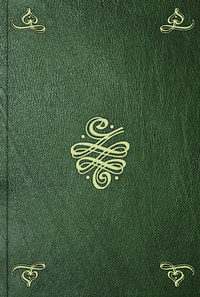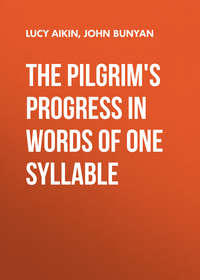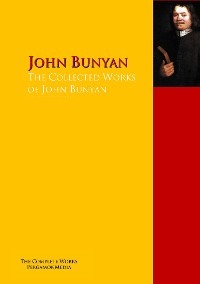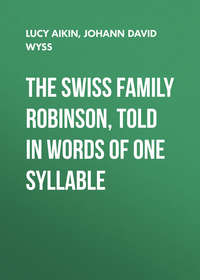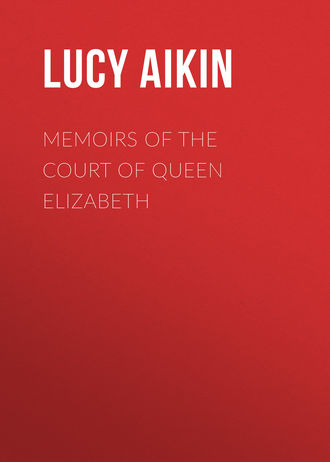 полная версия
полная версияMemoirs of the Court of Queen Elizabeth
All this time Elizabeth was in her heart as hostile to the court of France as the most zealous of her protestant subjects; for she well knew that it was and ever must be essentially hostile to her and her government; and in the midst of her civilities she took care to supply to the Hugonots such secret aids as should enable them still to persevere in a formidable resistance.
It is worth recording, on the subject of these negotiations between Elizabeth and the royal family of France, that Burleigh seems to have been encouraged to expect a successful issue by a calculation of the queen's nativity, seen by Strype in his own handwriting, from which it was foretold that she should marry, in middle life, a foreign prince younger than herself; and probably be the mother of a son, who should be prosperous in his middle age. Catherine de' Medici also, to whom some female fortune-teller had predicted that all her sons should be kings, hoped, after the election of her second son to the throne of Poland, to find the full accomplishment of the prophecy in the advancement of the youngest to the matrimonial crown of England. So serious was the belief of that age in the lying oracles of judicial astrology!
Among the English travellers doomed to be eye-witnesses of the horrors of the massacre of St. Bartholomew was the celebrated Philip Sidney, then a youth of eighteen. He was the eldest son of sir Henry Sidney, lord-deputy of Ireland, and from this excellent man and parent he had received, amongst his earliest and strongest impressions, those elevated principles of honor, veracity and moral purity which regulated and adorned the whole tenor of his after-life. An extraordinary solidity of character with great vivacity of parts had distinguished him from a child, and fortune conspired with genius to bring him early before the public eye.
He was nephew and presumptive heir to the earl of Leicester, by whom he was in a manner adopted; and thus patronized, his rapid advancement was anticipated as a matter of course.
It was the practice of that day for parents in higher life to dispose of their children in marriage at an age now justly accounted immature75; and no sooner had young Sidney completed his fourteenth year than arrangements were made for his union with Anne Cecil, daughter of the secretary. Why the connexion never took place we do not learn: sir Henry Sidney in a letter to Cecil says, with reference to this affair; "I am sorry that you find coldness any where in proceeding, where such good liking appeared in the beginning; but, for my part, I was never more ready to perfect that affair than presently I am." &c. Shortly after, the lady, unfortunately for herself, became the wife of the earl of Oxford; and Sidney, still unfettered by matrimonial engagements, obtained license to travel, and reached Paris in May 1572. Charles IX., in consideration no doubt of the influence of his uncle at the English court, gave him the appointment of a gentleman of his bed-chamber, a fortnight only before the massacre. On that night of horrors Sidney took shelter in the house of Walsingham, and thus escaped all personal danger; but his after-conduct fully proved how indelible was the impression left upon his mind of the monstrous wickedness of the French royal family, and the disgrace and misery which an alliance with it must entail on his queen and country.
He readily obeyed his uncle's directions to quit France without delay; and, proceeding to Frankfort, there formed a highly honorable and beneficial friendship with the virtuous Hubert Languet, who opened to him at once his heart and his purse. The remonstrances of this patron, who dreaded to excess for his youthful friend the artifices of the papal court, deterred him from extending his travels to Rome, an omission which he afterwards deeply regretted; but a leisurely survey of the northern cities of Italy, during which he became advantageously known to many eminent characters, occupied him profitably and delightfully till his return to his native country in 1575, after which he will again occur to our notice as the pride and wonder of the English court.
CHAPTER XVIII
1573 TO 1577Letters of lord Talbot to his father.—Connexion of Leicester with lady Sheffield.—Anecdote of the queen and Mr. Dyer.—Queen suspicions of Burleigh.—Countesses of Lenox and Shrewsbury imprisoned.—Queen refuses the sovereignty of Holland.—Her remarkable speech to the deputies.—Alchemy.—Notice of Dr. Dee—of Frobisher.—Family of Love.—Burning of two Anabaptists.—Entertainment of the queen at Kennelworth.—Notice of Walter earl of Essex.—General favor towards his son Robert.—Letter of the queen to the earl of Shrewsbury respecting Leicester.
Great as had been the injustice committed by Elizabeth in the detention of the queen of Scots, it must be confessed that the offence brought with it its own sufficient punishment in the fears, jealousies and disquiets which it entailed upon her.
Where Mary was concerned, the most approved loyalty, the longest course of faithful service, and the truest attachment to the protestant cause, were insufficient pledges to her oppressor of the fidelity of her nobles or ministers. The earl of Shrewsbury, whom she had deliberately selected from all others to be the keeper of the captive queen, and whose vigilance had now for so long a period baffled all attempts for her deliverance, was, to the last, unable so to establish himself in the confidence of his sovereign as to be exempt from such starts of suspicion and fits of displeasure as kept him in a state of continual apprehension. Feeling with acuteness all the difficulties of his situation, this nobleman judged it expedient to cause Gilbert lord Talbot, his eldest son, to remain in close attendance on the motions of the queen; charging him to study with unremitting attention all the intrigues of the court, on which in that day so much depended, and to acquaint him with them frequently and minutely. To this precaution of the earl's we owe several extant letters of lord Talbot, which throw considerable light on the minor incidents of the time.
In May 1573, this diligent news-gatherer acquaints his father, that the earl of Leicester was much with her majesty, that he was more than formerly solicitous to please her, and that he was as high in favor as ever: but that two sisters, lady Sheffield and lady Frances Howard, were deeply in love with him and at great variance with each other; that the queen was on this account very angry with them, and not well pleased with him, and that spies were set upon him. To such open demonstrations of feminine jealousy did this great queen condescend to have recourse! Yet she remained all her life in ignorance of the true state of this affair, which, in fact, is not perfectly cleared up at the present day.
It appears that a criminal intimacy was known to subsist between Leicester and lady Sheffield even before the death of her lord, in consequence of which, this event, which was sudden, and preceded it is said by violent symptoms, was popularly attributed to the Italian arts of Leicester. During this year, lady Sheffield bore him a son, whose birth was carefully concealed for fear of giving offence to the queen, though many believed that a private marriage had taken place. Afterwards he forsook the mother of his child to marry the countess of Essex, and the deserted lady became the wife of another. In the reign of James I., many years after the death of Leicester, sir Robert Dudley his son, to whom he had left a great part of his fortune, laid claim to the family honors, bringing several witnesses to prove his mother's marriage, and among others his mother herself. This lady declared on oath that Leicester, in order to compel her to form that subsequent marriage in his lifetime which must deprive her of the power of claiming him as her husband, had employed the most violent menaces, and had even attempted her life by a poisonous potion which had thrown her into an illness by which she lost her hair and nails. After the production of all this evidence, the heirs of Leicester exerted all their interest to stop proceedings;—no great argument of the goodness of their cause;—and sir Robert Dudley died without having been able to bring the matter to a legal decision. In the next reign the evidence formerly given was reviewed, and the title of duchess Dudley conferred on the widow of sir Robert, the patent setting forth that the marriage of the earl of Leicester with lady Sheffield had been satisfactorily proved.
So close were the contrivances, so deep, as it appears, the villanies of this celebrated favorite! But his consummate art was successful in throwing over these and other transactions of his life, a veil of doubt and mystery which time itself has proved unable entirely to remove.
Hatton was at this time ill, and lord Talbot mentions that the queen went daily to visit him, but that a party with which Leicester was thought to co-operate, was endeavouring to bring forwards Mr. Edward Dyer to supplant him in her majesty's favor. This gentleman, it seems, had been for two years in disgrace; and as he had suffered during the same period from a bad state of health, the queen was made to believe that the continuance of her displeasure was the cause of his malady, and that his recovery was without her pardon hopeless. This was taking her by her weak side; she loved to imagine herself the dispenser of life and death to her devoted servants, and she immediately dispatched to the sick gentleman a comfortable message, on receipt of which he was made whole. The letter-writer observes, to the honor of lord Burleigh, that he concerned himself as usual only in state affairs, and suffered all these love-matters and petty intrigues to pass without notice before his eyes.
All the caution, however, and all the devotedness of this great minister were insufficient to preserve him, on the following occasion, from the unworthy suspicions of his mistress. The queen of Scots had this year with difficulty obtained permission to resort to the baths of Buxton for the recovery of her health; and a similar motive led thither at the same time the lord-treasurer. Elizabeth marked the coincidence; and when, a year or two afterwards, it occurred for the second time, her displeasure broke forth: she openly accused her minister of seeking occasions of entering into intelligence with Mary by means of the earl of Shrewsbury and his lady, and it was not without difficulty that he was able to appease her. This striking fact is thus related by Burleigh himself in a remarkable letter to the earl of Shrewsbury.
Lord Burleigh to the earl of Shrewsbury.
"My very good lord,
"My most hearty and due commendations done, I cannot sufficiently express in words the inward hearty affection that I conceive by your lordship's friendly offer of the marriage of your younger son; and that in such a friendly sort, by your own letter, and, as your lordship writeth, the same proceeding of yourself. Now, my lord, as I think myself much beholding to you for this your lordship's kindness, and manifest argument of a faithful good will, so must I pray your lordship to accept mine answer, with assured opinion of my continuance in the same towards your lordship. There are specially two causes why I do not in plain terms consent by way of conclusion hereto; the one for that my daughter is but young in years; and upon some reasonable respects I have determined, notwithstanding I have been very honorably offered matches, not to treat of marrying of her, if I may live so long, until she shall be above fifteen or sixteen; and if I were of more likelihood myself to live longer than I look to do, she should not, with my liking, be married before she were near eighteen or twenty.
"The second cause why I defer to yield to conclusion with your lordship, is grounded upon such a consideration as, if it were not truly to satisfy your lordship, and to avoid a just offence which your lordship might conceive of my forbearing, I would not by writing or message utter, but only by speech to your lordship's self. My lord, it is over true and over much against reason, that upon my being at Buckstones last, advantage was sought by some that loved me not, to confirm in her majesty a former conceit which had been labored to be put into her head, that I was of late time become friendly to the queen of Scots, and that I had no disposition to encounter her practises; and now, at my being at Buckstones, her majesty did directly conceive that my being there was, by means of your lordship and my lady, to enter into intelligence with the queen of Scots; and hereof at my return to her majesty's presence I had very sharp reproofs for my going to Buckstones, with plain charging of me for favoring the queen of Scots, and that in so earnest a sort as I never looked for, knowing my integrity to her majesty; but, specially, knowing how contrariously the queen of Scots conceived of me for many things past to the offence of the said queen of Scots. And yet, true it is, I never indeed gave just cause by any private affection of my own, or for myself, to offend the queen of Scots; but whatsoever I did was for the service of mine own lady and queen, which if it were yet again to be done I would do. And though I know myself subject to contrary workings of displeasure, yet I will not, for remedy of any of them both, decline from the duty I owe to God and my sovereign queen; for I know, and do understand, that I am in this contrary sort maliciously depraved, and yet in secret sort; on the one part, and that of long time, that I am the most dangerous enemy and evil willer to the queen of Scots; on the other side, that I am also a secret well willer to her and her title; and that I have made my party good with her. Now, my lord, no man can make both these true together; but it sufficeth for such as like not me in doing my duty to deprave me, and yet in such sort is done in darkness as I cannot get opportunity to convince them in the light. In all these crossings, my good lord, I appeal to God, who knoweth, yea, I thank him infinitely, who directeth my thoughts to intend principally the service and honor of God, and, jointly with that, the surety and greatness of my sovereign lady the queen's majesty; and for any other respect but that may tend to those two, I appeal to God to punish me if I have any. As for the queen of Scots, truly I have no spot of evil meaning to her; neither do I mean to deal with any titles to the crown. If she shall intend any evil to the queen's majesty my sovereign, for her sake I must and will mean to impeach her; and therein I may be her unfriend or worse.
"Well now, my good lord, your lordship seeth I have made a long digression from my answer, but I trust your lordship can consider what moveth me thus to digress: Surely it behoveth me not only to live uprightly, but to avoid all probable arguments that may be gathered to render me suspected to her majesty, whom I serve with all dutifulness and sincerity;
and therefore I gather this, that if it were understood that there were a communication, or a purpose of a marriage between your lordship's son and my daughter, I am sure there would be an advantage sought to increase these former suspicions [word missing] purpose. Considering the young years of our two children [word missing] as if the matter were fully agreed betwixt us, the parents, the marriage could not take effect, I think it best to refer the motion in silence, and yet so to order it with ourselves, that, when time shall hereafter be more convenient, we may, and then also with less cause of vain suspicion, renew it. And, in the meantime, I must confess myself much bounden to your lordship for your goodness; wishing your lordship's son all the good education that may be mete to teach him to fear God, love your lordship his natural father, and to know his friends; without any curiosity of human learning, which, without the fear of God, I see doth much hurt to all youth in this time and age. My lord, I pray you bear with my scribbling, which I think your lordship shall hardly read, and yet I would not use my man's hand in such a matter as this is. [From Hampton Court, 25th Dec. 1575.]
"Your lordship's most assured at command"W. Burleigh76."A similar caution to that of lord Burleigh was not observed in the disposal of her daughters by the countess of Shrewsbury; a woman remarkable above all her contemporaries for a violent, restless and intriguing spirit, and an inordinate thirst of money and of sway. She brought to effect in 1574 a marriage between Elizabeth Cavendish, her daughter by a former husband, and Charles Stuart, brother of Darnley and next to the king of Scots in the order of succession to the crowns both of England and Scotland. Notwithstanding the rooted enmity between Mary and the house of Lenox, this union was supposed to be the result of some private intrigue between lady Shrewsbury and the captive queen; and in consequence of it Elizabeth committed to custody for some time, both the mother of the bride and the unfortunate countess of Lenox, doomed to expiate by such a variety of sufferings the unpardonable offence, in the eyes of Elizabeth, of having given heirs to the British sceptres.
A signal occasion presented itself to the queen in 1575 of demonstrating to all neighbouring powers, that whatever suspicions her close and somewhat crooked system of policy might now and then have excited, self-defence was in reality its genuine principle and single object; and that the clear and comprehensive view which she had taken of her own true interests, joined to the habitual caution of her character, would ever restrain her from availing herself of the most tempting opportunities of aggrandizement at their expense.
The provinces of Holland and Zealand, goaded into revolt by the bigotry and barbarity of Philip of Spain, had from the first experienced in the English nation, and even in Elizabeth herself, a disposition to encourage and shelter them; and despairing of being able longer to maintain alone the unequal contest which they had provoked, yet resolute to return no more under the tyranny of a detested master, they now embraced the resolution of throwing themselves entirely upon her protection. It was urged that Elizabeth,—as descended from Philippa wife of Edward III., a daughter of that count of Hainalt and Holland from one of whose co-heiresses the king of Spain derived the Flemish part of his dominions,—might claim somewhat of a hereditary title to their allegiance, and a solemn deputation was appointed to offer to her the sovereignty of the provinces on condition of defending them from the Spaniards.
There was much in the proposal to flatter the pride and tempt the ambition of a prince; much also to gratify that desire of retaliation which the encouragement given by Philip to the Northern rebellion and to certain movements in Ireland, as well as to all the machinations of the queen of Scots, may reasonably be supposed to have excited in the bosom of Elizabeth. Zeal for the protestant cause, had she ever entertained it separately from considerations of personal interest and safety, might have proved a further inducement with her to accept the patronage of these afflicted provinces:—but not all the motives which could be urged were of force to divert her from her settled plan of policy; and after a short interval of anxious hesitation, she resolved to dismiss the envoys with an absolute refusal. The speech which she addressed to them on this occasion was highly characteristic, and in one point extremely remarkable.
She reprobated, doubtless with great sincerity, the principle, that there were cases in which subjects might be justified in throwing off allegiance to their lawful prince; and protested that, for herself, nothing could ever tempt her to usurp upon the dominions either of her good brother of Spain or any other prince. Finally, she took upon her to advert to the religious scruples which had produced the revolt of the Hollanders, in a tone of levity which it is difficult to understand her motive for assuming: since it could not fail, from her lips especially, to give extreme scandal to the deputies and to all other serious men. She said, that it was unreasonable in the Dutch to have stirred up so great a commotion merely on account of the celebration of mass; and that so contumacious a resistance to their king could never redound to their honor, since they were not compelled to believe in the divinity of the mass, but only to be spectators of its performance,—as at a public spectacle. "What!" said she, "if I were to begin to act some scene in a dress like this," (for she was clad in white like a priest,) "should you regard it as a crime to behold it?77" Was the queen here making the apology of her own compliances under the reign of her sister, or was she generously furnishing a salvo for others? In any case, the sentiment, as coming from the heroine of protestantism, is extraordinary.
An ineffectual remonstrance, addressed by Elizabeth to the king of Spain, was the only immediate result of this attempt of the Provinces to engage her in their concerns. She kept a watchful eye, however, upon their great and glorious struggle; and the time at length came, when she found it expedient to unite more closely her interest with theirs.
England now enjoyed profound tranquillity, internal and external, and our annalists find leisure to advert to various circumstances of domestic history. They mention a corporation formed for the transmutation of iron into copper by the method of one Medley an alchemist, of which the learned but credulous sir Thomas Smith, secretary of state, was a principal promoter, and in which both Leicester and Burleigh embarked some capital. The master of the Mint ventured to express a doubt of the success of the experiment, because the adept had engaged that the weight of copper procured should exceed that of all the substances employed in its production; but nobody seems to have felt the force of this simple objection, and great was the disappointment of all concerned when at length the bubble burst.
About the same time the famous Dr. Dee, mathematician, astrologer, and professor of the occult sciences, being pressed by poverty, supplicated Burleigh to procure her majesty's patronage for his infallible method of discovering hidden treasures. This person, who stood at the head of his class, had been early protected by Leicester, who employed him to fix a lucky day for the queen's coronation. He had since been patronized by her majesty, who once visited him at his house at Mortlake, took lessons of him in astronomy, and occasionally supplied him with money to defray the expenses of his experiment. She likewise presented him to some ecclesiastical benefices; but he often complained of the delay or non-performance of her promises of pensions and preferment. On one occasion he was sent to the continent, ostensibly for the purpose of consulting physicians and philosophers on the state of her majesty's health; but probably not without some secret political commission. After a variety of wild adventures in different countries of Europe, in which he and his associate Kelly discovered still more knavery than credulity in the exercise of their various false sciences and fallacious arts, Dee was invited home by her majesty in 1589, and was afterwards presented by her with the wardenship of Manchester-college. But he was hated and sometimes insulted by the people as a conjurer; quarrelled with the fellows of his college, quitted Manchester in disgust, and failing to obtain the countenance of king James died at length in poverty and neglect;—the ordinary fate of his class of projectors. Elizabeth performed a more laudable part in lending her support to the enterprise of that able and spirited navigator Martin Frobisher, who had long been soliciting in vain among the merchants the means of attempting a northwest passage to the Indies, and was finally supplied by the queen with two small vessels. With these he set sail in June 1576, and though unsuccessful in the prime object of his voyage, extended considerably the previous acquaintance of navigators with the coasts of Greenland, and became the discoverer of the straits which still bear his name.
A sect called "The family of Love" had lately sprung up in England. Its doctrines, notwithstanding the frightful reports raised of them, were probably dangerous neither to the established church, with the rites of which the brethren willingly complied, nor yet to the state; and it may be doubted whether they were in any respect incompatible with private morals; but no innovations in religion were regarded as tolerable or venial under the rigid administration of Elizabeth; and the leaders of the new heresy were taken into custody, and compelled to recant. Some anabaptists were apprehended about the same time, who acknowledged their error at Paul's Cross, bearing faggots,—the tremendous symbol of the fate from which their recantation had rescued them. Two of these unhappy men, however, repented of the disingenuous act into which human frailty had betrayed them; and returning to the open profession of their opinions were burned in Smithfield, to the eternal opprobrium of protestant principles and the deep disgrace of the governess and institutress of the Anglican Church.


